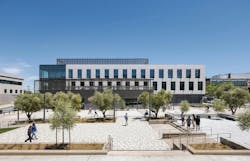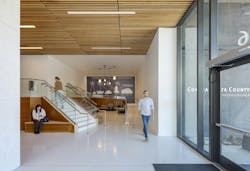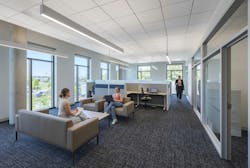World’s first TRUE Zero Waste for Construction-certified public project delivered in Calif.
By Peter Fabris, Contributing Editor
The Contra Costa County Administration Building in Martinez, Calif., is the world’s first public project to achieve the zero-waste-focused TRUE Gold certification for construction. The TRUE Certification for Construction program, administered by Green Business Certification Inc. (GBCI), recognizes projects that achieve exceptional levels of waste reduction, reuse, and recycling.
More than 95% of construction waste from the project was diverted from landfills and waste-to-energy facilities. That amounted to over 15,000 tons of waste reduced, reused, recycled, composted, and/or recovered for productive use. The project included the demolishing of a 12-story building and a historic jail. Marble from the building lobby was salvaged, cut, and reused in the new building lobby, alongside a history of the site mural.
Granite blocks from the historic Contra Costa County Jail, built in 1904, were repurposed as seat walls and paving throughout the new public plaza. Perforated wood panels taken from the original administration building built in 1962 were salvaged and reused. Concrete demolition material was reused as backfill for the new building, eliminating the need to haul away waste.
RELATED CONTENT:
California office/lab construction site earns world’s first TRUE preconstruction zero-waste certification
The project incorporated innovative waste sorting, management practices, and jobsite training. It included collaboration with suppliers to minimize packaging waste before being brought to the site. As a result of all the waste reduction and reuse practices on the project, greenhouse gas emissions were reduced by 8,500 metric tons, equivalent to what 1,800 gasoline-powered cars produce in a year. All About Waste, a zero waste and circular economy consultant, contributed their expertise to the project.
The new 65,000-sf, three-story office building and outdoor plaza will feature office spaces for public entities, including the Contra Costa County Sheriff’s department, Contra Costa County Television department, and the Contra Costa County Law Library. The Sheriff’s office amenities include meeting, locker, and break rooms, as well as level 4 ballistic glass, walls, and doors at reception. The facility also includes probation offices featuring interview rooms, an armory, burglar-resistant glass partitions, and an AI phone system. The outdoor plaza will be used for community events such as farmer’s markets and public performances.
On the project team:
Owner and/or developer: Contra Costa County
Design architect: Perkins&Will
Architect of record: Perkins&Will
MEP engineering:
PAE brought the design to 50% CD for Mechanical/Electrical/Plumbing
Plumbing - JW McClenahan
Mechanical - Peterson Mech
Electrical - Contra Costa Electric
Fire Protection – Allied
Low Voltage - WPCS
Structural engineer: Tipping
Civil Engineer: KPFF Consulting Engineers
Landscape Architect: MIG
General contractor/construction manager: Webcor
Here is the full press release from Webcor:
The Contra Costa County Administration Building and Redevelopment Project in Martinez, CA recently became the world's first Total Resource Use and Efficiency (TRUE) Gold for construction-certified public project, setting a new sustainability benchmark for public building projects worldwide. The design-build project was delivered by Webcor, a leading commercial construction company, in partnership with global design firm Perkins&Will and Contra Costa County.
The TRUE Certification for Construction program, administered by Green Business Certification Inc. (GBCI), recognizes projects that achieve exceptional levels of waste reduction, reuse, and recycling. Webcor's success in this endeavor was supported by the county's consultant, All About Waste, a zero waste and circular economy consultant.
This groundbreaking achievement underscores Webcor's commitment to sustainability and positions the company at the forefront of eco-friendly construction practices that support a circular economy.
"This project is a living testament of Contra Costa County's commitment to leading sustainably and making services more accessible for our community," said Federal Glover, Chair of the Board of Supervisors. "We're excited about setting a new standard for local government construction projects that prioritizes our environment and are grateful to our project partners for helping us achieve this success."
Highlights:
- First TRUE Gold for Construction-certified public project globally
- 95.07 percent of construction waste was diverted from landfills and waste-to-energy facilities, i.e. over 15,000 tons of waste were reduced, reused, recycled, composted and/or recovered for productive use in nature or the economy
- Greenhouse gas emissions were reduced by 8,500 metric tons, equivalent to what 1,800 gasoline-powered cars produce in a year
The 65,000-square-foot office building and plaza showcases Webcor's innovative approach to resource management and waste reduction. This certification follows Webcor's recent success with the GENESIS Marina project in Brisbane, which became the world's first TRUE-certified construction project in February 2024.
"Achieving TRUE Gold certification for a public building of this scale is a testament to Webcor's dedication to pushing the boundaries of sustainable construction," said Alec Bangs, Webcor senior project manager. "We're setting new industry standards and demonstrating that environmentally responsible practices can be implemented without compromising project budgets or timelines."
"Reusing materials in a project is always an exciting challenge," said Peter Pfau, Perkins&Will's design director. "By featuring the beauty and timelessness of the reclaimed marble in such a prominent place, we demonstrate Contra Costa County's values of sustainability and honor the investments of the past. It's a privilege to collaborate with clients and partners who share our commitment to the environment."
Key sustainability initiatives included:
- Salvaging and reusing materials from the demolished 12-story building and jail building
- Marble from the 12-story building lobby was salvaged, cut, and reused in the new building lobby, alongside a history of the site mural
- Innovative waste sorting, management practices, and jobsite training
- Collaboration with suppliers to minimize packaging waste before being brought on site
- Eliminating hauling and waste by reusing concrete demolition material as backfill for the new building.
Eric Angstadt, Contra Costa County Chief Assistant County Administrator, praised the project's transparency and accountability: "This certification required meticulous documentation of our waste management processes, ensuring that every piece of project waste reached its intended destination."
Mansi Bansai, Webcor project engineer, highlighted the project's innovative spirit: "We introduced several new ideas, such as using natural fiber-based gloves that were later repurposed into furniture. This project demonstrates how innovative thinking can lead to significant environmental benefits."



